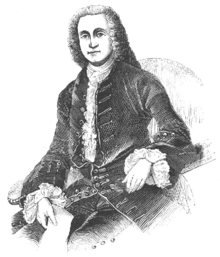George Grenville
George Grenville | |
|---|---|
 | |
| Prime Minister of Great Britain | |
| In office 16 April 1763 – 13 July 1765 | |
| Monarch | George III |
| Preceded by | The Earl of Bute |
| Succeeded by | The Marquess of Rockingham |
| Chancellor of the Exchequer | |
| In office 16 April 1763 – 16 July 1765 | |
| Monarch | George III |
| Preceded by | Sir Francis Dashwood, 2nd Bt. |
| Succeeded by | William Dowdeswell |
| Personal details | |
| Born | 14 October 1712 Westminster, London |
| Died | 13 November 1770 (aged 58) London |
| Political party | Whig |
| Alma mater | Christ Church, Oxford |
George Grenville (14 October 1712 – 13 November 1770), was a British Whig statesman who served in government for the relatively short period of seven years, reaching the position of Prime Minister of Great Britain. He was one of the few prime ministers (others include William Pitt the Younger, Sir Winston Churchill, George Canning, Spencer Percival, and William Gladstone) who never acceded to the peerage.
Grenville was the second son of Richard Grenville and Hester Temple (later the 1st Countess Temple). His elder brother was Richard Grenville-Temple, later the 2nd Earl Temple. Grenville received his education at Eton College and at Christ Church, Oxford, and was called to the bar in 1736. He entered Parliament in 1741 as member for Buckingham, and continued to represent that borough till his death.
In Parliament he subscribed to the "Boy Patriot" party which opposed Sir Robert Walpole. In December 1744 he became a lord of the admiralty in the administration of Henry Pelham. He allied himself with his brother Richard and with William Pitt the Elder (Richard's brother-in-law) in forcing their leader to give them promotion by rebelling against his authority and obstructing business. In June 1747 Grenville became a Lord of the Treasury, and in 1754 Treasurer of the Navy and Privy Councillor.
As Treasurer of the Navy in 1758 he introduced and carried a bill which established a fairer system of paying the wages of seamen. He remained in office in 1761, when Pitt (by then created Earl of Chatham) resigned upon the question of the war with Spain, and in the administration of Lord Bute functioned as Leader of the House of Commons. In May 1762 he was appointed Secretary of State for the Northern Department, and in October First Lord of the Admiralty; and in April 1763 he became First Lord of the Treasury and Chancellor of the Exchequer.
Prominent measures of his administration included the prosecution of John Wilkes and the passing of the American Stamp Act 1765, which led to the first symptoms of alienation between American colonies and Great Britain. The king made various attempts to induce Pitt to come to his rescue by forming a ministry, but without success, and at last had recourse to Lord Rockingham. When Rockingham agreed to accept office, the king dismissed Grenville (July 1765). He never again held office.
The nickname of "gentle shepherd" was given him because he bored the House by asking over and over again, during the debate on the Cider Bill of 1763, that somebody should tell him "where" to lay the new tax if it was not to be put on cider. Pitt whistled the air of the popular tune Gentle Shepherd, tell me where, and the House laughed. Though few surpassed him in a knowledge of the forms of the House or in mastery of administrative details, he lacked tact in dealing with people and with affairs.
In 1749 Grenville married Elizabeth Wyndham (before 1731-5 December 1769), daughter of Sir William Wyndham, by whom he had seven children:
- Charlotte Grenville (c. 1754-29 September 1830), who married Sir Watkin Williams-Wynn, 4th Bt. (before 1754-29 July 1789) on 21 December 1771 and had three children.
- George Nugent-Temple-Grenville, 1st Marquess of Buckingham, the father of the 1st Duke of Buckingham and Chandos
- Thomas Grenville, a Member of Parliament and book-collector
- Elizabeth Grenville (24 October 1756-21 December 1842), who married the 1st Earl of Carysfort (12 August 1751-7 April 1828) on 12 April 1787 and had three daughters.
- William Grenville, 1st Baron Grenville, who himself later became Prime Minister.
- Catherine Grenville (1761-6 November 1796), who married Richard Griffin (3 June 1751-28 February 1825), later the 2nd Baron Braybrooke, on 19 June 1780 and had four children.
- Hester Grenville (before 1767-13 November 1847), who married the 1st Earl Fortescue on 10 May 1782 and had issue.
Styles from birth to death
- Mr. George Grenville (1712-1741)
- Mr. George Grenville, MP (1741-1749)
- The Hon. George Grenville, MP (1749-1754)
- The Rt. Hon. George Grenville, MP (1754-1770)
See also
References
- This article incorporates text from a publication now in the public domain: Chisholm, Hugh, ed. (1911). Encyclopædia Britannica (11th ed.). Cambridge University Press.
{{cite encyclopedia}}: Missing or empty|title=(help) - The Grenville Papers, being the Correspondence of Richard Grenville, Earl Temple, K.G., and the Right Hon. George Grenville, their Friends and Contemporaries, were published at London in 1852, and afford the chief authority for his life. But see also Horace Walpole's Memoirs of the Reign of George II (London, 1845); Lord Stanhope's History of England (London, 1858); Lecky's History of England (1885); and ED Adams, The Influence of Grenville on Pitt's Foreign Policy (Washington, 1904).
- Prime Ministers of the United Kingdom
- British Secretaries of State
- Chancellors of the Exchequer of Great Britain
- Lords of the Admiralty
- Whig MPs (UK)
- Members of the Privy Council of Great Britain
- Members of the Parliament of Great Britain for English constituencies
- Old Etonians
- Alumni of Christ Church, Oxford
- 1712 births
- 1770 deaths

